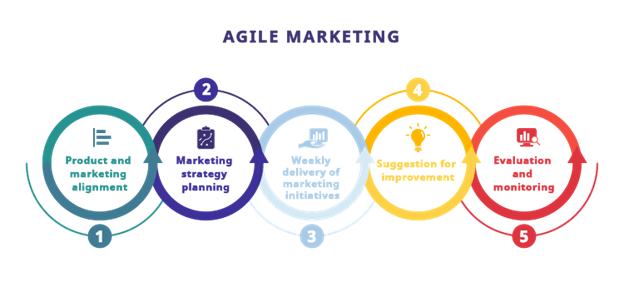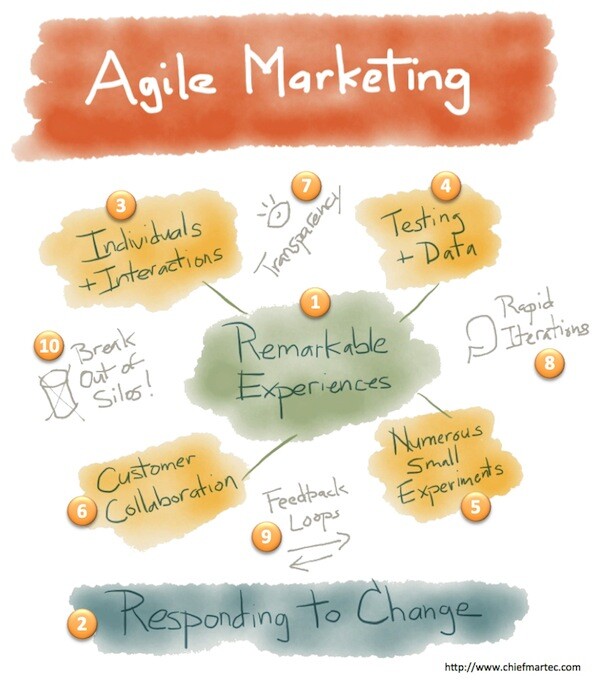The way a business functions in today’s fast-paced market landscape is drastically changing. One of the biggest hurdles to overcome is standing out from the noise of advertisements and the tsunami of content generated every day.
In this arena, #marketing teams face numerous challenges in reaching and engaging their target audiences. The digital era has transformed the way consumers interact with brands, necessitating a shift in marketing strategies.
A good solution to the problem is for organizations to build agile marketing teams that embrace flexibility and adaptability to thrive in this dynamic environment. This means that as the business landscape evolves, your team will too, and can keep up with current trends.
Let’s explore the importance of agility in marketing and provide insights on how to build and nurture an agile marketing team, capable of delivering exceptional results.
Understanding the Agile Marketing Paradigm:
“Agile marketing” is a mindset that enables teams to respond swiftly to changing market dynamics and customer needs. It borrows principles from “agile software development”, emphasizing iterative processes, collaboration, and continuous learning. By embracing agility, marketing teams can better navigate the evolving landscape, seize opportunities and drive business growth.

Image source: Jedi Squad
Cultivating a Culture of Agility:
To build an agile marketing team, organizations must foster a #culture that values flexibility, adaptability, and experimentation. Encouraging team members to embrace change, take calculated risks, and challenge the status quo, can create an environment where ideas flow freely, collaboration is encouraged, and failure is seen as an opportunity for growth and learning.
Empowering Cross-Functional Collaboration:
Agile marketing relies on cross-functional collaboration, breaking down silos and promoting seamless communications, mostly between internal stakeholders, thereby encouraging team members from various departments, such as design, content, analytics, and technology, to work together closely. This collaboration enables faster decision-making, facilitates innovation, and ensures a holistic approach to marketing initiatives to align with the desired goals.
Agile Planning and Execution:
Traditional marketing plans often follow rigid timelines and extensive upfront planning. However, the agile marketing teams of today implement planning and execution, that occur simultaneously in short cycles, similar to what we call the “sprint” in agile software development methodology. These sprints should allow for quick adaptations to market feedback and emerging trends, emphasize the importance of setting clear goals, prioritizing tasks, and regularly reviewing and adjusting strategies to maximize effectiveness.
Embracing Data and Analytics:
Data-driven decision-making is essential for agile marketing teams. Leveraging marketing analytics and real-time data to gain insights into consumer behavior, campaign performance, and market trends; helps to continuously monitor the key performance indicators (KPIs) and use data to implement informed strategies, make data-backed decisions, and optimize marketing efforts.
Continuous Learning and Experimentation:
Agile marketing teams prioritize continuous learning and experimentation to stay ahead of the curve. There is a dire need to encourage team members to test new ideas, run pilot campaigns, and quickly gather feedback from customers. Organizations need to embrace a culture of learning from successes and failures alike, fostering an environment that promotes innovation and adaptability.

Image source: Chiefmartec
Embracing Technology and Automation:
To enhance agility, marketing teams of today need to leverage technologies and automation tools. While automation can streamline repetitive tasks, freeing up time for strategic thinking and creative pursuits; utilizing marketing automation platforms, AI-driven analytics tools, and customer relationship management (CRM) systems to optimize your marketing efforts and deliver personalized experiences at scale.
Building an agile #marketingteam is crucial for success in today’s fast-changing business landscape. By embracing flexibility, adaptability, and a customer-centric mindset, organizations can navigate the complex challenges of the digital age and seize opportunities for growth.
My two cents to fellow marketers are –
Embrace agility and embark on a journey of continuous learning and improvement to stay current and able to overcome the changing ways of the marketplace.




